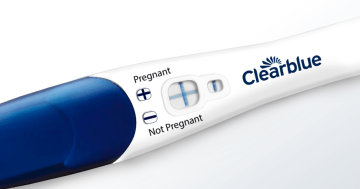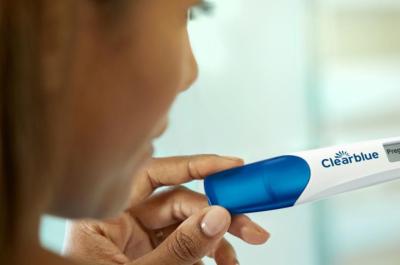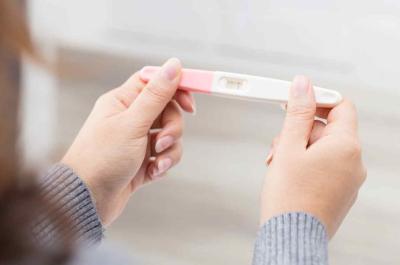False negative and false positive pregnancy test results explained

Nothing in this article is or should be construed as medical advice; for any medical questions, consult your doctor.
When you take a home pregnancy test, you put a lot of faith into its accuracy. It’s normal to wonder if the lines, symbols or words you’re looking at are correct, especially when rumors of false positives and false negatives abound. All you want is a clear answer: Am I pregnant?
Know this: All Clearblue® pregnancy tests are over 99% accurate from the day you expect your period.1 False positives very rarely occur, and are often due to medical conditions or certain medications. False negatives, while more common, typically occur due to testing too early or drinking too much liquid before testing. Let’s explore this some more.
What can cause pregnancy symptoms, but a negative test result?
Perhaps you’re more tired than usual, you’re a bit crampy and you swear your breasts feel tender. If you’re holding a negative pregnancy test, you’re probably wondering if you need to take another one. Rest assured that if you tested from the day you expect your period, your Clearblue® test is over 99% accurate.1 Test again in 3 days’ time, as you may have miscalculated when your period is due.
However, false negatives can happen and are usually caused by one of the following factors:
- Timing: If you’re testing early, you may have undetectable levels of human chorionic gonadotropin (hCG) in your urine, which is what home pregnancy tests detect to determine whether you’re pregnant. Clearblue® Early Detection Pregnancy Test provides early detection of the pregnancy hormone (hCG). 71% of pregnancies can be detected 6 days before the missed period (5 days before the expected period). If you use any Clearblue® pregnancy test before the day you expect your period and get a “not pregnant” result, test again three days later, as the level of hCG rises rapidly in early pregnancy. If your tests continue to be negative, and your period is now late, see your healthcare professional.
- Your period: It can be easy to miscalculate the expected date of your period. While typically cycle length is thought to be 28 days, this varies among women and between cycles. In fact, one study has shown that 46% of menstrual cycles vary by seven or more days.2 Further, up to one-third of women will experience irregular menstrual cycles in their life.3 Typically, you should be mindful of cycles that last longer than 38 days or are shorter than 24 days.4 There are many causes of irregular cycles including PCOS, stress, excessive exercise, thyroid issues, perimenopause and more.5 Starting and stopping hormonal birth control, including IUDs, can affect your menstrual cycle as well.5
- Your urine: If you have pregnancy symptoms but a negative test result, you may want to consider, of all things, your pee — especially if you tested early. Try again first thing in the morning, when your urine is most concentrated. It’s also important not to drink too much liquid before taking any home pregnancy test, no matter when you take it.
- Mistakes: Even though Clearblue® pregnancy tests are designed for easy use, we know that things happen. You may accidentally knock over the container holding your urine sample. Or you may inadvertently let the urine level go above the plastic housing of the test stick. Reread the instruction leaflet carefully and test again with a new test if you get a test error or think you may have tested incorrectly.
- Ectopic pregnancy: In rare cases, you can get a negative pregnancy test result while experiencing an ectopic pregnancy.6 According to The American College of Obstetricians and Gynecologists, early symptoms of ectopic pregnancy include low back pain, mild pain or cramping, and abnormal vaginal bleeding. As an ectopic pregnancy grows, you may experience more severe pain in your abdomen or pelvis, as well as shoulder pain. You may also feel weak and dizzy.7 An ectopic pregnancy is a medical emergency, and it’s important to seek help immediately if you think you’re experiencing one.
What can cause a false positive pregnancy test result?
Pregnancy tests work by detecting the pregnancy hormone hCG, and false positives are very rare. Three factors can cause you to get a false positive result: a recent pregnancy, certain medications and rare medical conditions:
- A recent pregnancy: HCG levels from a recent birth, miscarriage or termination can linger for up to 6 weeks.8 So, if you’re testing soon after one of these events, you may get a false positive if your test detects the remaining hCG levels from that recent pregnancy.
- Medications: Medications containing hCG, such as some fertility treatments, can lead to false positives. The test should NOT be affected by hormone therapies containing clomiphene citrate, common painkillers, alcohol, antibiotics or the contraceptive pill. Always read the manufacturers’ instructions for any medication you are taking before testing. If you get unexpected results, you should discuss them with your doctor.
- Medical conditions: In some rare cases, certain medical conditions can cause a rise in hCG levels, even if you’re not pregnant. These include certain cancers,9 kidney disease10 and some rare ovarian cysts.11
It’s also possible to get a positive test result and then find out later you are no longer pregnant. These are not false positives — they are true positive pregnancy results even though the pregnancy doesn’t continue. Often called an early pregnancy loss or a chemical pregnancy, navigating this unexpected turn of events can be difficult, and you may feel a wide range of emotions. First, know you’re not alone. Early pregnancy loss occurs in one in four pregnancies. Also, you may find some comfort in the fact that most women go on to have successful pregnancies following an early pregnancy loss.12 If you’re experiencing the signs of an early pregnancy loss, see your doctor.
Here’s the bottom line: If your period is due and you use a Clearblue® pregnancy test following the instructions carefully, the answer will be over 99% accurate.1 If your test result is negative and your period is late, test again three days later or see your doctor.

Looking for insights on your health journey? Clearblue® sends you curated, science-backed articles right to your inbox.
Sources and disclaimers
- Over 99% accurate from the day you expect your period. >99% accurate at detecting typical pregnancy hormone levels. Note that hormone levels vary. See insert.
- Creinin, M.D., Keverline, S., & Meyn, L.A. (2004), “How regular is regular? An analysis of menstrual cycle regularity,” Contraception, 70(4), 289–292, https://doi.org/10.1016/j.contraception.2004.04.012.
- Davis E, Sparzak PB, “Abnormal Uterine Bleeding,” updated February 10, 2021, StatPearls, https://www.ncbi.nlm.nih.gov/books/NBK532913/.
- “Abnormal Uterine Bleeding,” (December 2021), The American College of Obstetricians and Gynecologists, https://www.acog.org/womens-health/faqs/abnormal-uterine-bleeding/
- “What causes menstrual irregularities?” last reviewed January 31, 2017, US Department of Health and Human Services, https://www.nichd.nih.gov/health/topics/menstruation/conditioninfo/causes
- Kopelman ZA, Keyser EA, Morales KY, “Ectopic pregnancy until proven otherwise … even with a negative serum hCG test: A case report,” Case Reports in Women’s Health, April 2021, https://www.sciencedirect.com/science/article/pii/S2214911221000047?via%3Dihub
- “Ectopic Pregnancy,” February 2018, The American College of Obstetricians and Gynecologists, https://www.acog.org/womens-health/faqs/ectopic-pregnancy
- “What is HCG?” (n.d.), American Pregnancy Association, https://americanpregnancy.org/getting-pregnant/hcg-levels/
- “7 Causes for a False-Positive Pregnancy Test,” (May 11, 2017), Healthline, https://www.healthline.com/health/pregnancy/false-positive-pregnancy-test#Pregnancy-Symptoms:-10-Early-Signs-That-You-May-Be-Pregnant
- Soni, S., Menon, M. C., Bhaskaran, M., Jhaveri, K. D., Molmenti, E., & Muoio, V. (2013). Elevated human chorionic gonadotropin levels in patients with chronic kidney disease: Case series and review of literature. Indian journal of nephrology, 23(6), 424–427. https://doi.org/10.4103/0971-4065.120339
- Dawley, B., Acuna, A., & Grasu, B. (2012). Ectopic production of HCG by a benign ovarian mature cystic teratoma simulating an extra-uterine pregnancy: a case report. The West Virginia medical journal, 108(1), 15–17.
- “Early Pregnancy Loss,” February 2020, The American College of Obstetricians and Gynecologists https://www.acog.org/womens-health/faqs/early-pregnancy-loss

Can a positive result be wrong?
False positives are incredibly rare. Find out what can cause them and why you may get a negative result after testing positive.







